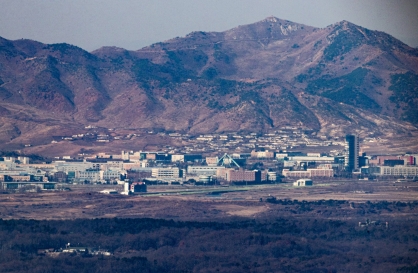South Korea already faces a turbulent security situation, with North Korea firing off missiles and relations with Japan at its lowest point. Now, the South’s closest ally is pressuring the government to pay more money for its troops stationed here.
Ever since the 1950-53 Korean War ended in a cease-fire, the United States has maintained troops in South Korea to defend its ally and to keep China and Russia in check.
With negotiations on cost-sharing for US troops here set to begin next month, Washington appears to be ratcheting up pressure on Seoul to shell out as much as some five times the current contribution of 1.04 trillion won ($861.4 million).
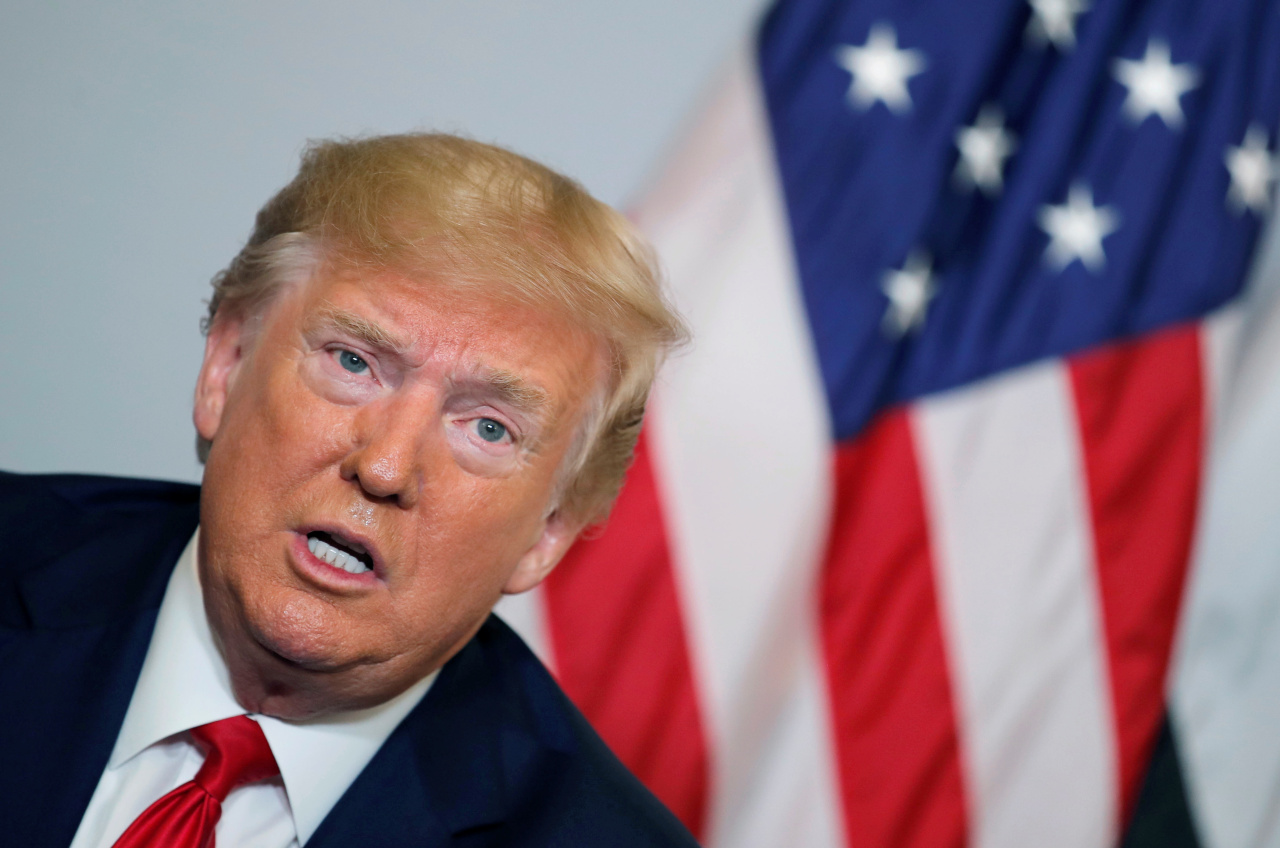 |
US President Donald Trump speaks at a meeting during the Group of Seven summit in France on Sunday. (Yonhap) |
Sharing the burden
South Korea hosts the third-largest contingent of US forces in the world -- 28,500 troops -- after Japan and Germany.
Seoul started to partly bear the cost of the US troops in 1991, when the country appeared economically more stable than before.
The Facilities and Areas and the Status of United States Armed Forces in Korea -- referred to as SOFA -- signed in July 1966 stipulated that the US would bear all costs for the maintenance of its troops in South Korea. Seoul, in return, agreed to provide all the facilities and areas necessary to the US forces.
In 1991, the two sides inked the Special Measures Agreement, an amendment to SOFA, under which South Korea agreed to provide financial support for the maintenance of the US troops.
Starting with $150 million in the first year of the agreement, South Korea has incrementally been increasing its share of the cost. In the 10th SMA negotiation this year, Seoul agreed to pay 1.04 trillion won ($861.4 million), an increase of 8.2 percent from the previous year.
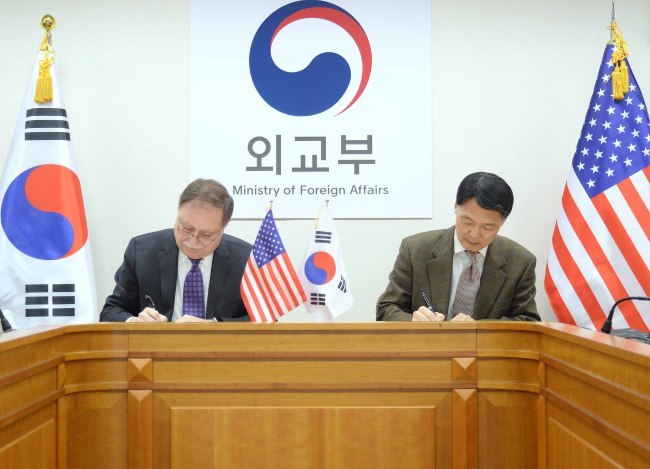 |
Chang Won-sam (right), South Korea’s delegate to defense cost-sharing talks with the United States, exchanges a letter of accord with his counterpart Timothy Betts in a signing ceremony in Seoul on Feb. 2. (Yonhap) |
However, the 1.04 trillion won is not the only cost South Korea bears for the US troops here.
According to Korea’s 2018 Defense White Paper, Seoul shoulders about 3.4 trillion won in total, including the figure agreed to in the defense-cost sharing deal, as it “indirectly” provides support in the form of land and other utility fees.
Reaching an agreement for the cost-sharing deal was not easy in the past, but it is expected to be even tougher under the administration of President Donald Trump.
Trump, who believes US troop deployments to allies only benefits those nations, has claimed that the countries should fully compensate for services even before he came to office.
As president, Trump is pressuring the US closest allies, including South Korea, Japan and Germany, to pay more for the US forces stationed in the respective countries.
For Korea, the US reportedly has demanded that it raise its contribution to almost $5 billion.
A local daily also reported that US national security advisor John Bolton brought a statement with details of US spending for the US forces stationed here, which came to $4.8 billion per year.
According to the daily, Bolton showed the statement to South Korean National Security Office Director Chung Eui-yong during his visit to Seoul in late July, saying South Korea would eventually have to bear the burden.
Following the recent decision by the South Korean government to not renew the military intelligence-sharing pact with Japan, the US has expressed strong disappointment on several occasions.
Via an official twitter account, US Department of State spokeswoman Morgan Ortagus said the termination of the General Security of Military Information Agreement with Japan would “make defending #Korea more complicated and increase risk to US forces.”
Experts say the strong US messages regarding GSOMIA may be motivated by what the US sees as an opportunity to blame South Korea for weakening trilateral cooperation with Japan, so that it can demand South Korea bear more financial burden to protect the region.
Before meeting Japanese Prime Minister Shinzo Abe on the sidelines of the Group of 7 summit in France, Trump also said combined military exercises with South Korea were “unnecessary” and “a total waste of money.”
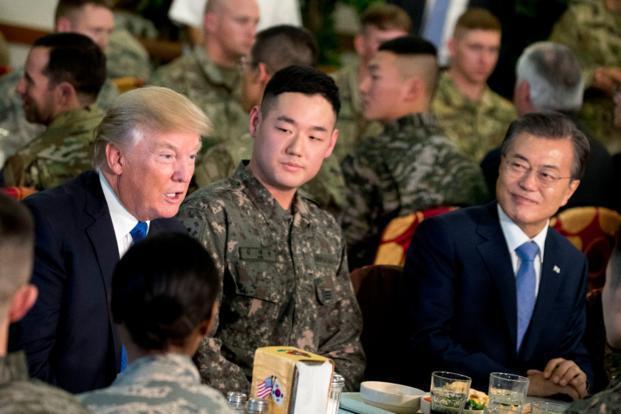 |
South Korean President Moon Jae-in and US President Donald Trump have lunch with US and South Korean tropps at Camp Humphreys in Pyeongtaek, South Korea. (AP-Yonhap) |
‘Alliance fee’As the US changed what was originally a five-year deal to one that is valid for one year in the SMA signed in early February, the allies have to negotiate next year’s amount before the deadline at the end of this year.
The negotiations are likely to be launched as early as the middle of next month, after the Chuseok holiday that falls on Sept. 13, according to the Foreign Ministry.
Experts say the reported $5 billion bill for the cost-sharing deal would likely include payment for the annual joint US-South Korea military exercises and South Korea’s contributions to other US-led international military operations.
When the negotiations began last year for the 10th SMA, Washington had asked Seoul to finance “operational support” covering the deployment of strategic assets, a Foreign Ministry official explained. But Seoul continued to reject that condition, saying it was not part of the deal’s purpose, and the US retracted the proposal.
“The US appears to be thinking of collecting an ‘alliance fee,’” Park Won-gon, a professor of international politics at Handong Global University, said.
“The ‘alliance contribution’ is not only directed at Korea, but for all allies, and it is seeking payment for the military security it presents as public good.”
The bill may include external costs, such the maintenance of strategic assets and 65,000 US troops that are agreed to be deployed in case of contingency on the Korean Peninsula, Park said.
Such costs could also include other forms of contributions, such as South Korea’s participation in the US-led international maritime force protecting ships in and around the Strait of Hormuz.
However, if the United States does present a $5 billion bill, it would be violating Article 5 of SOFA. The funds agreed to in the SMA, which is an exceptional clause of Article 5 of SOFA, only stipulates usages for the maintenance of the USFK deployed, Park explained.
Article 5 of SOFA states that the United States will bear for the duration of the agreement all expenditures incident to the maintenance of the US Armed Forces in Korea.
“If the United States continues to challenge the SMA and demand an increase, they might have to initiate a new agreement for the defense-cost sharing deal,” Park said.
By Jo He-rim (
herim@heraldcorp.com)



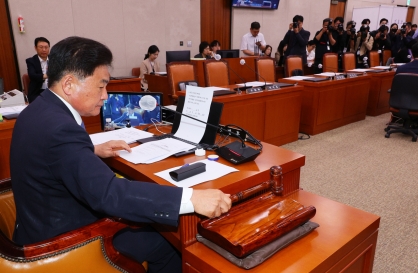
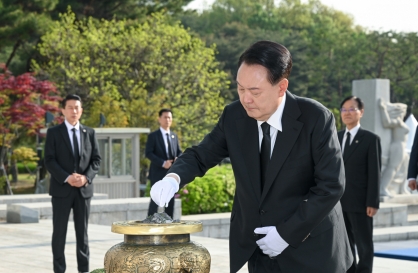



![[Graphic News] More Koreans say they plan long-distance trips this year](http://res.heraldm.com/phpwas/restmb_idxmake.php?idx=644&simg=/content/image/2024/04/17/20240417050828_0.gif)
![[KH Explains] Hyundai's full hybrid edge to pay off amid slow transition to pure EVs](http://res.heraldm.com/phpwas/restmb_idxmake.php?idx=644&simg=/content/image/2024/04/18/20240418050645_0.jpg)
